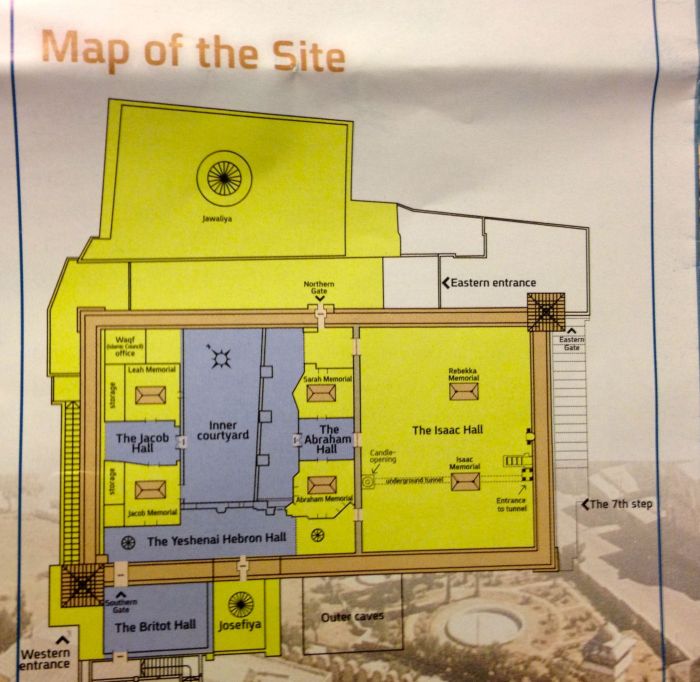Today I visited the Cave of the Patriarchs in Hebron, Israel. It’s where Abraham, a man celebrated by Muslims, Christians and Jews, is believed to be buried (as well as other notables from the early family of the bible). After the 1994 massacre the tomb was divided in half. From the Israeli side of the tomb, you can only enter the areas in blue. From the Palestinian side, you can only enter the areas in yellow. The excellent Hebron tour I took allowed access from both sides, with an Israeli guide for one half and a Palestinian guide for the other.
One thread running through the bible, a line of thinking shared by both my friend Bryan Zug and the tour guide I had for half of the tour, is that the story of humanity is really about sibling strife. We get lost in the drama about humanity and god, but if you focus on the sibling stories, Cain and Abel. Isaac and Ishmael, The Prodigal Son, you discover a different lesson, another way to see what the stories may be trying to tell us. Many books of the bible, or any chapter of the history of Jerusalem, reveals a litany of brothers, sisters and family working against each other.
I was hoping that visiting the Cave of Patriarchs, the site built to remember the one person that unifies all three faiths, would fill me with a sense of connection. But as I entered each site of the now divided building I couldn’t help but think perhaps there was a lesson here we were all working very hard not to learn.
The cenotaph for Abraham is a beautifully ornate green stonework, but it’s hidden behind iron spars. And if you look carefully through the gaps you can see the window on the other side, where the faithful of another faith can honor the same heritage, looking through their own set of protective glass and steel bars.



I can feel the love. This is an account how divisive religion really is. What would some future civilization think of this tomb if they found it the way it is now?
LikeLike
I’d more likely point to the divisiveness in the human race being reflected here in how people interpret religion than to point to religion itself. I mean it’s not like we don’t have examples of non-religious groups (e.g. political parties, sports teams, neighbors) who make the same kind of sad choices. Neighbors often have a hard time simply living next door to each other. We are a co-operative species just as much as we are competitive and we just haven’t (or can’t?) evolved our way towards better judgement of when to be which.
LikeLiked by 1 person
I totally agree. I will also admit that I am biased towards religion as THE major cause as an atheist in the U.S. Maybe one day we will be able to live in peace, but history hasn’t shown that to be the case. I do have hope.
LikeLiked by 1 person
But then again… to argue with myself, which is always fun, what is religion if it doesn’t include instructions for humans for how the religion should be followed? Many people use scripture as an instruction manual, which is a fair thing to want in a religion, but the more scripture I read the more it’s clear no work of scripture was written primarily with a modern sense of instruction in mind.
I’m a writer so I’m biased in my doubt of the perfection of any written work, but what if in some alternative universe the supreme being dictated to these alternative human beings an instruction manual and they simply wrote it down wrong – how would they know?
LikeLike
Blaming religion is a fairly simple act of substitution. It’s convenient, but like blaming language for verbal abuse.
Nearly all conflict is at the root the protection of self and extensions of self (family, tribe, nation). Religious fundamentalism is just one of cloaks we hide the self-protection in. Nationalism, classism, racism, and more all do the same.
Multiple religions teach a concept of giving up something—especially self—to gain something greater. We are, however, so loss-averse that we can barely give such precepts lip service, much less survive the uncomfortable lessons to get good at actually sacrifice.
LikeLiked by 1 person
“Religious fundamentalism is just one of cloaks we hide the self-protection in. Nationalism, classism, racism, and more all do the same.”
I agree – and that’s part of what fascinates me about religion. So many of the commandments and precepts are the same, or similar, but the way we interpret, manipulate or modify them is fascinating. The Cave of the Patriarchs was an undeniable experience of confusion for me, in how divided something so similar can become.
LikeLike
I can’t help thinking about the composition of the first photo – from the shadows and plant life in the wall, to the flowers and sky in the heavens up above. In the second pic, I feel like I can virtually stick my neck through the rails to get a closer look at what’s inside. I’m also trying to visually connect with who and what’s beyond the barriers on the other side. Great pics!
LikeLiked by 1 person
[…] from Jerusalem, but to get there requires crossing the border into Palestinian land. Unlike my trip to see the Cave of The Patriarchs in Hebron, the border crossing here was immense and intimidating. You can see the dividing wall, with its […]
LikeLike